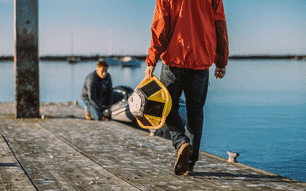The main aim of the STAC is to advise the IPNLF on how to develop wellbeing amongst coastal fisheries by increasing the global supply of socially and environmentally responsible pole and line caught tuna.
The meeting focused on eight key topics: general pole and line fisheries data capture, livebait, fish aggregating devices (FADs), advocacy and governance, environmental issues, bycatch, post harvest and social equity.
At the end of the two-day meeting, the committee had a long list of important action areas under each topic plus the immediate priorities for the months ahead. Those priorities are as follows:
General pole and line fisheries data capture
Encourage and support strengthening the collection, compilation and dissemination of fisheries data in pole and line fisheries. This has two parts: (1) Encourage the recording of catches of neritic tuna other than primary target species in pole and line fisheries; and (2) Ensure these efforts are consistent with regional formats and regional fisheries management organisations (RFMOs).
Livebait
Look at a generic approach to bait fish assessment. This has three important aspects: (1) Clarify and demonstrate whether bait management plans are needed for specific pole and line fisheries third-party certification; (2) Encourage livebait fisheries to formulate management plans; and (3) Review and make historical data available where appropriate.
FADs
Develop a good understanding of the role of FADs in pole and line fisheries, and the role of advocacy in defending that position as necessary.
Advocacy and governance
There are three important but separate priorities within advocacy and governance: (1) Study the implication of Indonesian membership in RFMOs; (2) Communicate stock status and the overcapacity of purse seiners (and fishing fleets generally) to nation states’ fisheries departments; and (3) Increase collaborations and information exchange with NGOs.
Environmental issues
Provide data to refute incorrect claims on certain pole and line fisheries issues. This will require standardised studies of fuel use intensity in pole and line, purse seine and longline fishing, the differences in bycatch (species and composition) around FADs from pole and line compared with purse seine and the impacts on the structure of ecosystems by pole and line fisheries.
Bycatch
Encourage existing and new observer programmes and port-sampling activities with the objective of characterising the bycatch in terms of species and quantities.
Post harvest
Review the quality of fish from various fleets and develop best practice guidelines for post-harvest handling. In addition, facilitate industry collaboration in order to improve the value chain.
Social equity
Review relevant information on the social benefits of pole and line fisheries. Also consider assessing the potential impacts on local communities of increased pole and line exports.
By advising the International Pole & Line Foundation on the most impactful areas in which they can work, the scientists involved in STAC are contributing to creating jobs for fishermen and supporting the future of fishing communities worldwide.
The Kuala Lumpur meeting was co-funded by IPNLF members Marks & Spencer, MMP, Ocean Brands and World Wise Foods.



